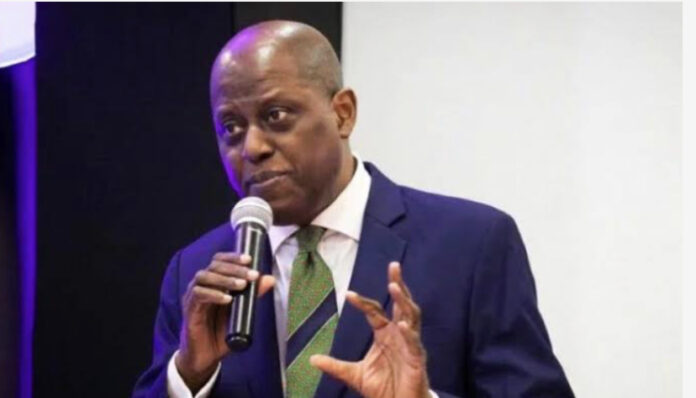In the first seven months of this year, Nigeria’s debt servicing increased by 53.63%, or $971.47 million, reaching $2.78 billion, up from $1.81 billion during the same period in 2023. This information was provided in the Weekly International Payments data on the Central Bank of Nigeria’s website.
The Central Bank’s data indicated that the largest external debt servicing amount occurred in May, totaling $854.36 million, followed by $560.51 million in January and $542 million in July. Servicing costs in February, March, and April were below $300 million, with June 2024 having the lowest payment at $50.82 million. In contrast, the highest external debt servicing amount in 2023 was $641.69 million in July, followed by $400.47 million in March, with other months staying below $300 million, including a low of $54.35 million in June 2023. This pattern of lower payments was repeated this year.
Debt servicing constitutes a major part of the weekly international payments by the Central Bank of Nigeria. As of the end of the first quarter, Nigeria’s debt was reported to be N121.67 trillion, according to the Debt Management Office.
The DMO report read, “Nigeria’s total public debt stood at N121.67tn ($91.46bn) as of March 31, 2024. The comparative figure for December 31, 2023, was N97.34tn ($108.23bn). Total domestic debt was N65.65tn ($46.29bn), while total external debt was N56.02tn ($42.12bn).”
Providing details about the increase in the public debt, DMO said, “The increase in naira terms of N24.33tn is being misinterpreted as new borrowing. The amount represents new borrowing of N2.81tn as part of the new domestic borrowing of N6.06tn provided in the 2024 Appropriation Act, new domestic borrowing of N4.90tn as part of the securitisation of the N7.3tn Ways and Means Advances approved by the National Assembly, as well as, the depreciation in the official naira exchange rate from $/899.39 in Q4, 2023, to $/N1,330.26 in Q1, 2024.”
Tajudeen Ibrahim, Director of Research and Strategy at Chapel Hill Denham, supported the Debt Management Office’s view that the devaluation of the naira contributed to the rise in Nigeria’s debt servicing costs. He also identified an additional factor driving the increase.
“One, there is a foreign currency translation impact on the debt servicing, and the second factor is the actual increase in the debt value itself because, in the period that you are looking at, Nigeria has taken on more debt both internationally and locally. Nevertheless, there is some element of currency devaluation in the figure that you are looking at,” he said.
Market analysts have cautioned that Nigeria risks falling into a debt trap if it continues to accumulate loans at higher interest rates. Due to its low credit rating, Nigeria struggles to access cheaper funding, which will lead to increased debt servicing costs and affect both recurrent and capital expenditures. Experts suggest either halting borrowing or focusing borrowing on capital projects rather than consumption.
In May, Fitch Ratings revised Nigeria’s outlook on its Long-Term Foreign-Currency Issuer Default Rating from stable to positive, affirmed the rating at ‘B-’, and projected that debt servicing would reach $4.8 billion in 2024.
“Government external debt service is moderate, expected at $4.8bn in 2024 and $5.2bn in 2025 (with $2.9bn of amortisations, including a $1.1bn Eurobond repayment due in November). The government plans to meet its external financing obligations through a combination of multilateral lending, syndicated loans, and potentially from commercial borrowing,” Fitch said in its commentary.
Despite the current administration’s emphasis on domestic borrowing from the capital market, it was reported that about 30% of Nigeria’s external reserves consist of foreign exchange bank swaps. In 2023, the Federal Government’s external debt service payments rose by $1.1 billion to $3.5 billion for the fiscal year, with $1.9 billion for market debt and $1.6 billion for non-market debt. For 2024, the government projects spending N8.25 trillion on debt servicing.
President Bola Tinubu has committed to breaking the cycle of excessive borrowing for public spending, which strains government resources due to high debt servicing costs.
A July report by The PUNCH revealed that 22 states collectively spent N251.79 billion on servicing debts from previous administrations within nine months of taking office. Additionally, these states took out new loans totaling N310.99 billion between July 2023 and March 2024, despite increased allocations from the Federation Account. This data was sourced from the budget implementation reports of each state, accessed via Open Nigerian States, a platform backed by the civic organization BudgIT, which advocates for transparency.
In August, Nigeria introduced a $500 million domestic FGN US dollar bond as part of a $2 billion program. The bond, aimed at pension funds, banks, and both local and international Nigerians, was launched during a hybrid roadshow in Lagos.
Analysts have projected that the new bond issuance will enhance Nigeria’s external reserves, contributing to the stabilization of the naira. Professor Uche Uwaleke from Nasarawa State University, who is also the President of Capital Market Academics of Nigeria, noted that bond issuance offers several benefits. He explained that it provides investors with a risk-free return, as dollar deposits in banks yield minimal interest, and the bond interest is exempt from income tax. Additionally, it allows for portfolio diversification and offers a cheaper alternative for government financing amidst high domestic debt servicing costs due to tight monetary policy. Uwaleke emphasized that the raised dollars would be used to support the forex market and could lead to reduced reliance on the naira bond market, thereby freeing up capital for the private sector.
On the other hand, economist Marcel Okeke cautioned against the risk of increasing dollarization in the economy.
According to him, “There is the danger of dollarisation of the Nigerian economy – especially in this case of a dollar-denominated local bond.”
Okeke, a former Chief Economist of Zenith Bank Plc, added, “Overtly or covertly, therefore, the ongoing issuance of domestic dollar-denominated bonds is outright dollarisation of the economy. Period!
“Section 15 of the CBN Act 2007 states that, ‘The unit of currency in Nigeria shall be the Naira which shall be divided into one hundred kobo.” Section 20 (1) of the Act states that ‘The currency notes issued by the Bank shall be legal tender in Nigeria at their face value for the payment of any amount.’ The ongoing dollar-denominated bond sale in Nigeria, therefore, is an official dollarisation or the introduction of what the IMF calls a ‘bi-monetary’ system.
“The domestic dollar bond issuance and its implied entrenchment of a bi-monetary system by the Federal Government of Nigeria leaves the economy with a dicey outlook. This implicit dollarisation of the Nigerian economy portends a further weakening and relegation of the naira.”
Source: The Punch




